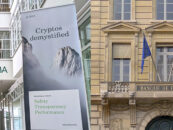There now appears to be plenty of scope for blockchain to be used for financial purposes beyond simple transactions. Cryptographic ledger technology could end up replacing costly financial intermediaries in financial markets which could have seismic effects on the infrastructure of the industry.
The ledger technology, which is basically a distributed database, could potentially underpin the formation of a new type of commodity futures market, for example, whereby it manages both ends of the transaction without expensive fees being incurred or a long settlement process being induced. As for the physical commodities markets, however, further work appears needed in order to account for the exchange of information that is required to validate delivery and receipt of the physical commodities, as well as the associated transfer of ownership title.
While most financial markets only exist in electronic format (for example, stocks and bonds), commodities markets often require delivery of the physical commodities, whether it be barrels of oil or tonnes of grain. A distributed ledger system could enhance this process. A ‘consortium’ blockchain is one in which only specific permitted organizations have access to the decentralized ledger and consensus is used to verify and confirm transactions.
Such a consortium could potentially be set up for commodities markets whereby those with access to the ledger would be the trading participants and additional trusted parties, such as those involved in the commodities’ storage and delivery. This would be an effective method to ensure the commodities are delivered as per the transactional details. A multi-authorized escrow system could also be set up to ensure funds are transferred as and when delivery is successful.
Kynetix Taking the Lead
UK firm Kynetix, a global provider of “Delivery & Settlement, Financing & Collateral, Self-Service inventory and Post Trade services for the Commodities markets,” announced in November that it was forming a consortium to investigate the use of ledger technology in commodities markets.
Thus far, the UK company has managed to assemble a group of 15 commodity exchanges, banks, clearing houses and brokers – as yet unnamed – and in doing so, seeks to position itself between the physical economy and financial markets by using blockchain technology to produce an immutable ledger of title-related activities among commodity traders.
The Double-spend problem
The need to verify physical inventories and to eliminate fraudulent actions have always accompanied commodities markets. Consciousness of this need has risen after the 2014 Qingdao port scandal, which has hastened the need for verification systems to eliminate fraud. The scandal revolves around a series of repurchase (or ‘repo’) metal transactions between Mercuria and Citibank involving copper and aluminium stocks that were supposedly being stored at Qingdao and Penglai ports in eastern China.
However, concerns over the status of those metal stocks were raised following a fraud case involving Chinese metals trading company, Dezheng Resources, as well as its subsidiaries, who used fake duplicate warehouse receipts in order to obtain several Chinese and foreign bank loans against a single deposit of metals at the port. While neither Mercuria nor Citi were guilty of any wrongdoing, legal proceedings between the two parties resulted from the fallout. Major implications for the future of commodity-backed financing deals in China are also expected to arise, such as higher costs for trading houses. Here, the distributed ledger technology can offer a solution.
Kynetix CEO Paul Smyth believes that the Qingdao port scandal would not have occurred if the financing of the commodity had been operated through a distributed ledger. The problems arising from such storage system were receipts are forged, are avoided when distributed ledger technology is utilised as records are kept by a vast array of users across the network, meaning that the integrity of the data would have been upheld at all times.
More specifically, the ‘double spend’ problem would be mitigated – whereby one party cannot trick the system by transferring one amount to two separate parties and hence spending some money more than once.
Title Ownership
Certain elements of the commodities trade life cycle are particularly suited to be impoved by ledger technology – as Kynetix’ head of business development Guillaume Kendall points out. He specified that the issue of title transfer, ie who owns what, has been identified by Kynetix as being potentially improved by ledger technology.
Indeed, December 1st saw Kynetix successfully transfer title to one lot of pepper using Sentinel, its in-house blockchain platform and which links the financial markets to the physical economy through the creation of electronic records of title, ownership and commodity storage information.
The challenge of title registry has also been addressed by Texas-based blockchain start-up Factom, who is assisting the government of Honduras in building a secure land title record system using blockchain. The country has suffered significant land title fraud in the past as a consequence of hacked databases, which resulted in bureaucrats unfairly gaining access to the best properties.
By putting all of the government’s land titles on the blockchain, Factom president Peter Kirby believes Honduras would surpass the systems implemented in other countries, even developed ones.
Whether the same technology is ready to be applicable to commodities has not yet been determined, although Factom has since announced a joint collaboration with Serica, a company who since 2014 (under its previous name DigitalTangible) has facilitated trading between bitcoin and digital tokens representing holdings of physical precious metals. Indeed, the company was first to launch a marketplace for physical silver on the blockchain.
In fact, using its patented Proof of Custody ledger technology, customers can immediately see, with complete transparency, substantial information about their valuable hard assets, while they can also convert precious metal investments into digital money wherever Bitcoin is accepted. In doing so, Serica is offering investors market transparency and speed that is not available in traditional precious metals markets.
Conclusion
The former head of global commodities at JP Morgan Chase, Blythe Masters has said of the ledger technology that she takes it “as seriously as you should have taken the concept of the internet in the early 1990’s. It’s a big deal. And it is going to change the way that our financial world operates”. Perhaps among all financial markets, however, commodity markets are at the most embryonic stage with regards to ledger technology, which is unsurprising given the complex nature of the physical market.
However, progress is being made. Incidentally, the US Commodity Futures and Trading Commission decided in September to officially class bitcoin as a commodity. This in itself should prompt accelerated development of the ledger technology in relation to its application in commodities markets.







9 Comments so far
Jump into a conversationAccording to research by Boston Consulting Group (BCG), neary $53 billion has been spent on fintech companies and there are currently around 3,500 Fintech companies in the world. These companies support a wide range of industries, in which the financial-banking sector benefits the most.
Fintech in the financial sector – banks connect lenders with borrowers, pay bills with a smartphone app, manage portfolios with automated robots… Obviously, Fintech is changing banking and finance industry.
Blockchain is the only mechanism to accurately and privately record transactions for the parties involved because cryptocurrencies are anonymous.
This industry attracts more and more followers.
Hello, cherished acquaintance!
With continued advancements and adoption, blockchain has the power to fundamentally transform the way commodity markets operate, ushering in a new era of efficiency and integrity.
It is a really good and useful bit of information
I appreciate you giving us this useful information.
Kindly keep us informed in this manner. I appreciate you sharing.
Thank you.